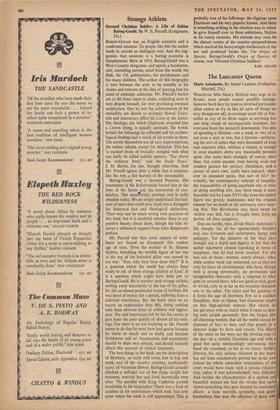Strange Athlete
BARING-GOULD was an English eccentric and a confirmed amateur. To people like this the nation tends to accord an indulgent awe. And the sug- gestion that someone is a boring eccentric is blasphemous. Born in 1834, Baring-Gould was a West Country clergyman and squire, a handsome, curt, unsmiling person, aloof from the world, the flesh, his 136 publications, his parishioners and his many children. The author of this biography is torn between the wish to be sensible in his claims and remorse at the idea of denying him his meed of nostalgic adulation. Mr. Purcell's tactics are to flit from claim to claim, exploding each in turn despite himself, for ever promising eventual satisfaction. One by one the achievements of his versatility are shown as seriously flawed. Fairy- tale and inaccuracy afflict his Lives of the Saints. His theology, for which Gladstone awarded him a Crown living, is equally unsteady. He bowd- lerised the folksongs he collected and his archaeo- logical findings had a touch of his novels in them. The novels themselves are all racy improvisations, the author admits, except for Mehalah. This has 'a marked strain of brutality mingled with what can fairly be called sadistic passion. "Far above the ordinary level," said the Daily News.' J. M. Barrie, for one, thought otherwise. And Mr. Purcell agrees after a while that it contains, like the rest, a fair harvest of the inexcusable.
Baring-Gould was a devoted Puseyite. His resentment at the Reformation buried him in the lives of the Saints and the restoration of can- delabra. This omnfflorous amateur zest is sadly obsolete today. We no longer understand the rich- ness of spirit that could pour itself into a disregard for historical fact and theological distinction. There may not be much wrong with practices of this kind, but it is doubtful whether there is any positive beauty about them, though the idea re- ceives a whimsical support from John Betjeman's preface.
Mr. Purcell sees that some aspects of saint- liness are bound to disconcert this restless age of ours. 'Even the mother of St. Simeon Stylites, beholding the terrible figure of her son at the top of his befouled pillar was moved to cry out: "Son, why hast thou done this?" It is a question which the world has always been ready to ask of these strange athletes of God.' It is a question which might have been put to Baring-Gould. He is another such strange athlete, writing away inscrutably at the top of his pillar, his life an almost penitential tissue of hobbies. He was short of money for a period, suffering from a deferred inheritance. But the book takes us no nearer an explanation than this, doing nothing with these obvious traits of coldness and aggres- sion. The odd impression left by his life comes in part from the poor quality of almost all his writ- ings. For there is no use implying as Mr. Purcell seems to do that he must have had genius because he wrote so much and so badly and because Swinburne said so. Amateurism and eccentricity should be their own reward, and should scarcely afford this amount of critical immunity.
The best things in the book are the descriptions of Horbury, an early mill town, lost in fog and work, and of the country customs, unaffectedly outre, of Victorian Devon. Baring-Gould actually plucked a mill-girl out of her clogs, taught her manners, married her and lived laconically ever after. The parallel with King Cophetua proved irresistible to his biographer. There was a kind of candour in his enthusiasms which took him into areas where his work is still appreciated. This is probably true of his folksongs, the diggings upon Dartmoor and his very popular hymns. And there is something striking in the absolute way in which he gave himself over to these addictions, Stylites in his lonely rectories. His attitude may even be the distant cousin of the massive purposefulness which marked the heavyweight intellectuals of the era and produced books like The Origin of Species. Baring-Gould's Origin of Species, of course, was 'Onward Christian Soldiers.'
KARL MILLER






























 Previous page
Previous page